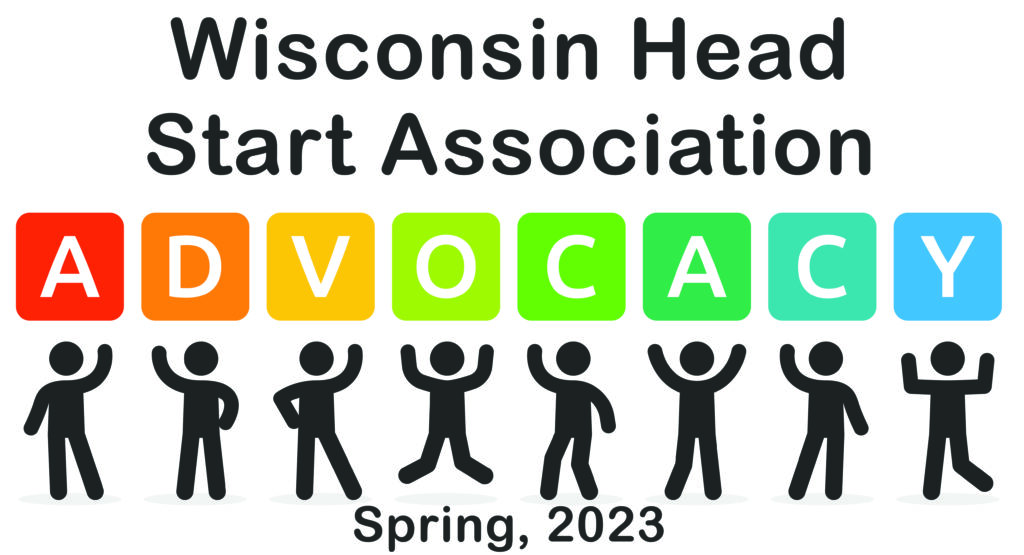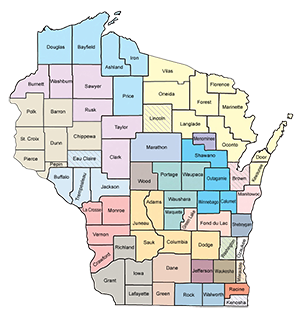
Wisconsin Head Start Association Spring Advocacy Event: April 3-5, 2023
Wisconsin Head Start Association is collaborating with Wisconsin Early Childhood Association, Voices for Health Kids, Wisconsin Partners, and more to bring you our best advocacy event yet! Join us on April 3-5 at the Concourse Hotel and Governor’s club in Madison, WI. A brief event outline can be found below. More information will become available as the event approaches.

April 3rd: WHSA Business, affiliate/BoD meetings, and supplemental content for those who do not take part in affiliate work.
April 4th: Training on Child Care Counts, its effects on the Head Start Community, and why NOW is the time to advocate for its permanence in the WI state budget. Understand the early care and education landscape and how we’re all in it together. Understand the state budget process.
April 5th: Find your voice! Training on telling your story in an impactful way, speaking to legislative representatives, utilizing your experiences to become an impactful advocate. More information on the necessity of Child Care Counts. Visits at the Wisconsin State Capitol!*
*A lobbying team will be provided by Raising WI to assist with the scheduling of legislative visits. Please identify a “Program Team Leader” during registration to take point on this work.
Where: The Concourse Hotel and Governors Club
When: April 3-5, 2023
Cost:
HS/EHS Parents: $195 (includes the full 3-day event and the ECE Advocacy Day at the Capitol)
HS/EHS Staff:$295 (includes the full 3-day event and the ECE Advocacy Day at the Capitol)
Advocacy Day Only:$150 (Parent & Staff. Only Includes the morning trainings and Legislative visits on Wednesday, April 5th)
Early-Bird Special: Save $50 on any full-event registration ticket. (Not applicable to Advocacy Day Only tickets. Expires: 3/1/23)
Audience: Everyone! Staff, managers, directors and especially Head Start parents.
Room block information: Individuals are requested to call The Concourse Hotel and Governors Club directly at 1-800-356-8293 to make reservations. The Group will advise its attendees to identify themselves as part of WHSA 2023 Spring Advocacy Event when making their guest room reservations.
Room block deadline: March 23, 2023
Event Schedule:
| Date | Presenter | Session details |
| 4/3 | WHSA business meetings | April 3rd, 2023 12:30-1:00 WHSA Affiliates: orientation, concurrent director and staff/parent sessions 1:00-1:15 break 1:15-2:30 Advocacy and Outreach 2:30-2:45 break 2:45-4:00 Professional development committee 4:15-6:15 WHSA Board and dinner |
| 4/4 | Advocacy Training with collaboration from WECA, WI Partners & Voices for Healthy Kids | April 4th, 2023 8:00-8:50 Morning Yoga 9:00-9:30 WHSA Welcome/Opening Ceremony 9:30-10:30 Raising Wisconsin-understanding the early care and education landscape and how we’re all in it together. 10:30-10:45 Break |
| 10:45-12:00 Understanding the state budget process | ||
| 12:00-1:00 WHSA Luncheon | ||
| 1:00-2:30 Advocating for Child Care Counts Now! 2:30-2:45 Break |
||
| 2:45-4:30 Effective Storytelling and workshop in breakouts | ||
| 4/5 | Finding your Voice and WI Legislative Visits | April 5th, 2023 9:00-9:30 Welcome and opening with partners 9:30-10:45 Advocating for Child Care Counts now! |
| 11:00-4:00 Capitol Visits |
Information on Child Care Counts:
Child Care Counts has been a vital lifeline in the midst of the ongoing effects of COVID-19, which significantly worsened Wisconsin’s already fragile child care infrastructure. Even prior to the pandemic, Wisconsin faced a child care crisis driven by the lack of available quality child care.
Child Care Counts – launched in 2020 and supported through COVID-relief funding – has provided this long-needed direct support to child care programs to allow them to remain open and retain staff . A total of more than $700 million is allocated to Child Care Counts through January 2024. Payments assist with operating expenses, supplement early educator compensation, and, in turn, make care more affordable for families. Even with this significant relief funding, programs still struggle and remain at a critical breaking point, further underscoring the need for significant state investment.
Without financial support, programs would have been forced to close or reduce their availability at even higher rates, causing a ripple effect across the state of families struggling to find already-scarce care and the resulting workforce and economic implications. In fact, the long-term negative economic impact of the state’s child care crisis is estimated at $4.2 to $6.4 billion, driven in part by a higher rate of working mothers (68%) than the national average (62%).
January 2024 will mark the start of a damaging cliff if policymakers do not allocate significant state funding for continuity in support of child care. Wisconsin historically invests the minimum state general purpose revenue to leverage its federal Child Care and Development Block Grant at just more than $16 million, which equates to a minimal $50 per child investment at nearly 320,000 children under age 5. The CCDBG funds are limited to only families who qualify for Wisconsin Shares (185% of the federal poverty level). The pandemic underscored how much more is required to keep child care affordable and available, businesses operating, and communities thriving.
In fact, more than 90 percent of center-based and family child care providers who received stabilization grants said the funding helped their programs stay open. Three-quarters of providers said the end of stabilization grants, like Child Care Counts, would have a negative effect on their programs, according to research from the National Association for the Education of Young Children (NAEYC). More than 45,000 Wisconsin child care slots have been saved by American Rescue Plan Act (ARPA) funding.
The state’s child care landscape underscores the need for significant public investment: An average family with children under age 5 spends one-fifth to one-third of their household income on care, which is increasingly scarce. About 50 percent of Wisconsin, and 70 percent of rural areas, are child care “deserts,” where there is only one regulated slot for every three children under age 5.
Meanwhile, programs operate on razor-thin margins with budgets balanced on parent fees, which, despite being costly to families, do not cover the full cost of programs providing high-quality care. As a result, child care professionals are paid poverty-level wages averaging $11 to $13 an hour while rarely accessing benefits despite the importance of their profession. The result is a blatantly broken business model the free market cannot address.
It’s essential for Wisconsin policymakers to invest significant state funding to support child care – an incredibly vital yet historically under-resourced public good. Families, child care programs, early childhood educators, businesses, and communities have felt the effects of this reality for years yet policymaker action has notably lagged behind
Click Here for more information!
Questions: contact Brian at Brians@whsaonline.org or Jennie at Jenniem@whsaonline.org.


